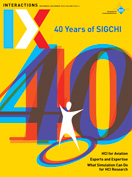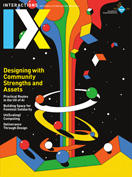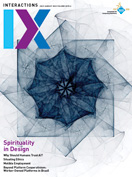Authors:
Patricia Garcia, Alejandra Gonzalez, Mikayla Buford, Sheena Erete, Jakita Thomas, Yolanda Rankin
In the past decade, feminist theory has gained traction within the HCI community as a critical design approach [1,2]. Despite the push for feminist solidarity, however, prior feminist HCI work has largely been conducted on a single-axis analysis of power that focuses on gender and fails to address issues of race and racism that negatively affect women of color [3,4]. Such oversight marginalizes women who live at the intersection of race and gender and renders them invisible within a feminist movement that continues to benefit white, middle-class women at the expense of their racialized sisters [3,4,5]. We, as a community of scholars, must do the work of building inclusive spaces that pave the way for honest dialogue that amplifies voices that have been ignored, silenced, or erased. It is this process, an act of resistance, that creates true sisterhood among women from all walks of life because it perceives differences as opportunities to learn from one another rather than requiring sameness or conformity as evidence of unity or allyship. We begin the work of building inclusive HCI spaces by exploring what feminist solidarity could look like between female scholars who live at the intersection of race and gender, yet whose lived experiences differ in historical legacy, sociocultural norms, language, and culture. This article chronicles our journey as Chicanas and Black women who chose to come together to form a collective and create a welcoming space in which we could bring our whole authentic selves and engage in dialogic interactions that allowed us to listen to and learn from one another and work toward a feminist future that honors and celebrates the diversity of women.
→ Feminist solidarity does not require conformity. Rather, it recognizes differences as an opportunity to learn from one another while growing together.
→ Form your own collective for engaging in dialogue around various feminist theories, texts, and other forms of expression with scholars of diverse backgrounds.
 Intentionally Building a Space for Sisterhood
Intentionally Building a Space for Sisterhood
Recognizing the need to apply critical feminist frameworks that center the intersectional experiences of racialized women within the HCI community, we, Chicanas and Black women, came together to develop a group that could think critically together and engage with multiple texts that spoke to our lived experiences while developing an understanding of how we could apply these feminisms in the context of designing technology. We formed our collective in August 2021 and for nine consecutive months met on a biweekly basis for one hour. During these meetings, we allocated time together to read different texts written by Chicana and Black feminists, reflect critically and share with one another our interpretations of these texts, and write in response to our readings, world events, and our lived experiences. We discussed identity, history, and language related to race, gender, and ethnicity. We also used this time to discuss personal experiences related to how we navigate academic spaces and contend with power relations (e.g., the tenure process) that oppress Chicanas and Black women in academia. Appreciating the social interactions and spirit of fellowship, we leveraged our position and privilege as scholars to bridge feminist scholarship and critical theory with design practices that benefit minoritized populations. After several meetings, we realized that we had cultivated something special—an intentional process for developing feminist solidarity. This intentional process has evolved into a methodology that we feel compelled to make salient to the HCI community, as this is the work done behind the scenes that is essential to establishing sisterhood and unity but is often lacking when feminist scholars articulate their work.
We intentionally present our methodology as a list of strategies. For us, the word strategy acknowledges that fostering feminist solidarity is an active process, a strategic endeavor that relies on an emergent and evolving set of practices. We outline the six strategies that helped us create time and space for embarking on this journey together.
Strategy 1: Establish boundaries of exploration. Interrogating how systems of power within computing and design fields grant or deny privilege requires specificity and boundaries. We chose to avoid the generic use of the terms feminism and intersectionality since this terminology has become all too common. Instead, we chose to honor the historical, political, and cultural backgrounds of different feminisms and to be specific about which feminist intellectual lineages would inform our discussions. Based on our lived experiences and research interests, we chose to engage with ideas from Black feminist thought and Chicana feminism [6,7,8,9]. We collaboratively created a reading list of foundational texts that served as our intellectual guides and discussed them together, weaving our personal histories and professional experiences with the ideas presented in the texts.
Strategy 2: Explore different modes of expression. Computing and design fields privilege academic discourse and empirical investigations as tools for generating knowledge. Black feminisms and Chicana feminisms, on the other hand, rely on non-positivist epistemologies and recognize lived experience as a form of knowledge [6,7,8,9]. In our collective, we sought sources of knowledge that extended beyond academic and design work. Our shared inquiry of feminist solidarity within HCI included different modes of expression, such as documentaries, podcasts, and poems. We also allowed ourselves to respond to the ideas in different modalities, including reading, writing, and personal storytelling.
Strategy 3: Honor intragroup difference. Research conducted in computing and design fields benefits from the pain of minoritized groups. Academic careers can be built from research on or about minoritized groups and the inequalities they face. Recognizing the danger of HCI research that perpetuates deficit narratives, our collective brought together different racial groups that have historically been pitted against one another, to create a counternarrative of solidarity and respect. We discussed how economic exploitation, political disenfranchisement, and medical neglect kill our communities and try to force us to see one another as threats and as competition for limited resources. To achieve feminist solidarity, we had to confront the shared vulnerabilities of our communities and see one another as allies across difference. In this collective, we honored and found strength in our differences; we embraced the complexity of our identities and histories.
We had to confront the shared vulnerabilities of our communities and see one another as allies across difference.
Strategy 4: Recognize power explicitly. Research on minoritized communities in computing and design fields often does not acknowledge the systems of power that influence both the object and the process of investigation. Failing to recognize power differences between groups interferes with feminist solidarity because it does not acknowledge how power relations structure our interactions and lives. Within this collective, we did not want power to function as an invisible force. We sought to be explicit about the systems of power that structured our interactions. We acknowledged differences in our social and economic standings, including how being at different levels of our careers influenced what we wanted to accomplish together. We explicitly discussed how power differences were distributed across ourselves, as individuals who were students and faculty, and how those differences structured who spoke and how we spent our time together. We also identified the external forms of power that suffocated our collective learning like academic pressures, tenure and promotion, and toxic family histories.
Strategy 5: Value time. Academia has an insatiable thirst for time. We decided our time is not an unlimited resource and valued our time together as an act of resistance. We fought the pressure to publish, publish, publish. Instead, we used our time as a working meeting to read, write, and share, rather than in isolation. We had loosely structured agendas and worked through our discussions slowly, allowing ourselves to be sidetracked and ignoring any feelings of needing to get "back on task." Our biweekly meetings gave us time and permission to be ourselves, to be free.
Strategy 6: Foster vulnerability and trust. Our collective was also a healing space that built trust and allowed for vulnerability. We talked about the past and the present, and how they affect the future. We learned about one another's family histories, lived experiences, traumas, and hopes for the future. We were vulnerable in deep ways, discussing our innermost worries. For example, we grappled with questions about what we were giving up and what parts of ourselves we were losing as we navigated academic spaces and engaged in identity negotiations. We countered those worries by drawing on the work of Chicana feminist Gloria Anzaldúa [6] and creating space to explore our cultures and language. We have created space to grow our language and struggled together to understand the complexities of how language relates to race and identity, such as discussing the differences between Latinx and Latine.
In presenting these strategies, we do not aim to speak for all women. We acknowledge that we are cisgender Chicanas and Black women and cannot speak for our transgender and gender-nonconforming colleagues and allies. We also do not address other forms of difference or intersecting identity categories such as ability, sexuality, nationality, and class. For us, race and gender are salient identity categories that influence our lived experiences and we have chosen to speak from those positions. Despite these limitations, we present our collective experiences as an example of what feminist solidarity can look like between Chicanas and Black women who share the goal of creating a more inclusive HCI field. We view our strategies as acts of resistance against academia and its insatiable thirst for our time, ideas, and lives. We chose to learn together, to go slow, to go off topic, and to make space for our personal stories throughout our inquiry process. We invite you to form your own collective and do the same.
1. Bardzell, S. Feminist HCI: taking stock and outlining an agenda for design. Proc. of the SIGCHI Conference on Human Factors in Computing Systems. ACM, New York, 2010, 1301–1310.
2. D'Ignazio, C., Michelson, R., Hope, A., Hoy, J., Roberts, J., and Krontiris, K. 'The personal is political': Hackathons as feminist consciousness raising. Proc. ACM Hum.-Comput. Interact. 4, CSCW2 (Oct. 2020), Article 150; https://doi.org/10.1145/3415221
3. Erete, S. Using black feminist epistemologies and activist frameworks to counter structural racism in design. Interactions 28, 5 (Sep.–Oct. 2021), 56–59; https://doi.org/10.1145/3479981
4. Erete, S., Rankin, Y.A., and Thomas, J.O. I can't breathe: Reflections from Black women in CSCW and HCI. Proc. ACM Hum.-Comput. Interact. 4, CSCW3 (Dec. 2020), Article 234; https://doi-org.ezproxy.depaul.edu/10.1145/3432933
5. hooks, b. Feminism Is for Everybody: Passionate Politics. Pluto Press, 2000.
6. Anzaldúa, G. Borderlands/La Frontera: The New Mestiza. Aunt Lute Books, San Francisco, 1987.
7. Collins, P.H. Black feminist thought as oppositional knowledge. Departures in Critical Qualitative Research 5, 3 (2016), 133–144; https://doi.org/10.1525/dcqr.2016.5.3.133
8. Collins, P.H. Black Feminist Thought: Knowledge, Consciousness, and the Politics of Empowerment. Routledge, New York, 2000.
9. A.M. García., ed. Chicana Feminist Thought: The Basic Historical Writings (1st ed.). Routledge, New York, 1997; https://doi.org/10.4324/9780203760642
Patricia Garcia, an assistant professor in the School of Information at the University of Michigan, conducts research on the complex relationship between race, gender, and computing. Her work examines how girls of color construct a sense of self and leverage computing to account for their ways of knowing and existing in the world, including how they use computing to enact social change. [email protected]
Alejandra Gonzalez is a design research assistant at DePaul University in Chicago. She is interested in understanding the relationships between power and design and approaches research from a community-centered and justice-oriented lens. [email protected]
Mikayla Buford is a design researcher and creative technologist. Her research interests lie at the intersection of human-computer interaction, Black feminisms, and speculative design. She holds an M.Des. in integrative design from the University of Michigan and a B.S. in computer science from the University of Wisconsin-Madison. [email protected]
Sheena Erete is an associate professor in the School of Information at the University of Maryland College Park. Her work focuses on codesigning sustainable technologies, practices, and policies with community organizations to counter structural oppression using equity-centered, justice-oriented, assets-based approaches to research and design. [email protected]
Jakita O. Thomas is an associate professor of computer science and software engineering in the Ginn College of Engineering at Auburn University. She is also director of the CUltuRally and Socially Relevant (CURSOR) Computing Lab. She is a recipient of the National Science Foundation's Faculty Early Career Development Award (2012–19) as well as the Presidential Early Career Award for Scientists and Engineers (2016). [email protected]
Yolanda A. Rankin is an assistant professor in the School of Information at Florida State University and director of the DEsigning Technologies for the UndeRserved (DETOUR) Research Lab, which explores designing technologies with and for underserved populations. She is a recipient of the 2016 Woodrow Wilson Early Career Enhancement Fellowship. [email protected]
Copyright held by authors. Publication rights licensed to ACM.
The Digital Library is published by the Association for Computing Machinery. Copyright © 2022 ACM, Inc.






Post Comment
No Comments Found